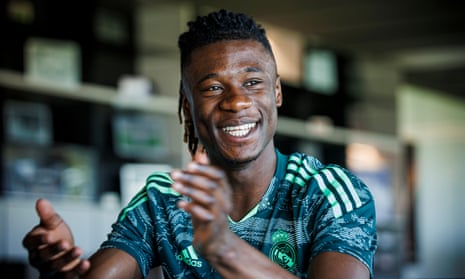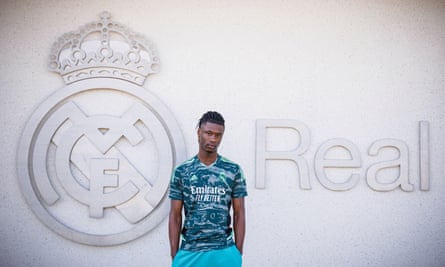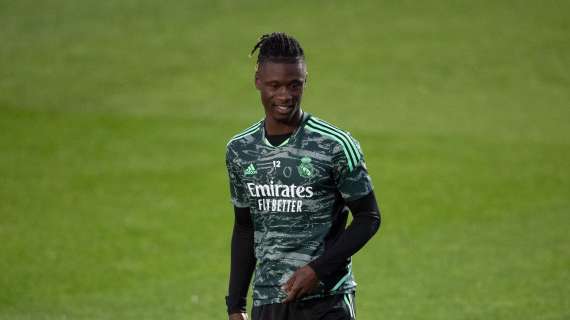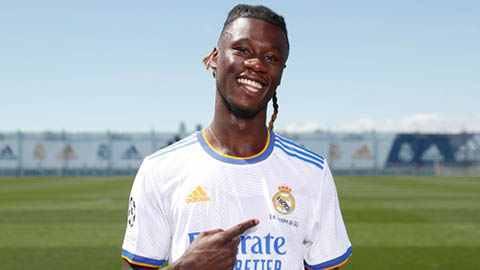The midfielder talks about leaving Angola, his honest parents, and Liverpool’s Champions League victory before the match.

Eduardo Camavinga claims, “My dad told me I was the one who was going to uplift the family.” He was 11 years old back then; he is now 20 and beaming. He never stops grinning.
He recalls seeing the fire engines while he was in his fifth year of school. The third of six children born to Congolese parents in a refugee camp in Miconge, Angola, he was just a toddler when his family emigrated to France, first to Lille and then to Fougères, a charming town in Brittany with a population of 20,000. It burned down that day. They had stayed there for a year.

They currently reside in Madrid, and he is searching for the word first in French, then in English (which he converses with Antonio Rüdiger and occasionally assists in here), and last in Spanish. He at least hopes that it is Spanish. “Orgulloso? Is that it, then? Portuguese, perhaps? Proud? They are pleased with me.
That grin is back. He exclaims, “I’m happy that my family is happy.”
At 16 years and 4 months old, the football player who made his Rennes debut was also the youngest player to represent France since the Second World War. He joined Madrid at age 18 and won the European championship at age 19. “I live life as it happens,” he declares. I’ll reflect on my origins years from now.

The pitch at Valdebebas is bathed in sunlight coming through patio doors. Four enormous towers constructed on the former training ground of Madrid rise above the city in the distance. Photos, medals, vintage boots, shirts, tickets, and ID cards of Alfredo Di Stéfano, Ferenc Puskas, and Zinedine Zidane are displayed on the shelves. Posters from the team’s 14 European Cup victories are displayed, and there’s even a big, ornately embroidered sombrero with Carlo Ancelotti’s name sewn on it.Camavinga says, “I’m not going to say it’s normal, but I’m here.” “I wouldn’t say winning the Champions League is typical, but I really relished the occasion. When I’m older, I’ll reflect more on the fact that in my first year, we won the Champions League. But this place has a culture where winning is expected.

“We traveled to France when I was not even two years old; I have no recollection of it, and we haven’t really talked about it much. When I inquire… A pause is made.My family migrated to France in search of a better life because conditions there were challenging. My dad simply informs me that there have been numerous conflicts. I’ve seen images of me when I was still a baby in Angola from when we first arrived in France. Lille comes to mind first, followed by Fougères and Rennes.

Camavinga describes football as an outlet; he thinks that the challenges his family encountered made them stronger and gave him a place to belong. “Football is my life,” he declares. “I have made all of my pals in life through football. I got my start young. I didn’t want to play, though. I first only wanted to practice judo. I wished I could be like my brother, who practiced judo. I enjoyed brawling occasionally, too.
.jpg?auto=webp&format=pjpg&width=3840&quality=60)
He begins to giggle, which is something he frequently does, and then he mentions his mother, Sofia, and his father, Celestino, which he also frequently does. “I only ever battled at home; never at school. Mom forbade me from practicing judo. She encouraged me to take up football. How do you refer to it? Destiny? It’s because of my mother and Fatima, a student at the institution.”I played the roulette game during a tournament with another school, and my team won. My mother received a message from Fatima saying, “You need to get him into football; he can play.” She included me on the team the following week.”When I was a youngster, it would be ‘Zidane talents’ on YouTube. My brother was in Barcelona, and I was in Madrid. If my father feels I play poorly, he will tell me. He will be waiting when I get home and will want to discuss it, I know that. And my mother. But my father always says what he thinks.

As he speaks, Celestino’s direction may be seen frequently. When Camavinga discusses the wealth that comes with the game, including cars, watches, and other items, he says: “It’s not for me, and my dad’s close by. If I buy too many things he’s going to kill me.”He responds to the question of why he never seems to get tired by saying, “It’s a mental thing: I don’t think I’m dead on my feet and so I’m not. ‘It’s not your body, it’s your mind,’ my father can be heard saying.